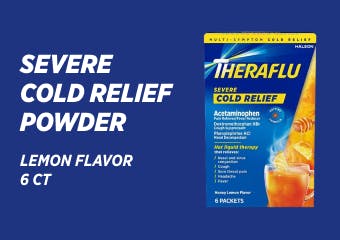What is a cold or flu-related cough?
A cough that is brought on by a cold or the flu is usually dry and persistent. Over time, it may worsen, becoming uncomfortable, and even painful. In addition, it’s not uncommon to experience chest discomfort and shortness of breath. In general, it usually lasts about 2 weeks.2
Is a cold or flu-related cough serious?
Coughs can be irritating and even sometimes painful, but they usually go away in a couple of weeks.2 While you can usually go to work or school, remember that you’re probably still contagious, so make sure to practice good hygiene. Wash your hands often and always cough into a tissue or your sleeve.3 If your cough doesn’t go away after a couple of weeks, it’s probably time to see a doctor.
Why might a cold or flu cause a cough?
A cough happens when your body produces too much mucus. Usually, mucus isn’t harmful, and our bodies produce it all the time.6 Mucus acts as a lubricant to keep the tissues in our lungs, sinuses, mouth, stomach, and intestines moist.6 Mucus also protects your body because some of the harmful things you breathe through your nose, like dust and other allergens, get stuck in the mucus when you breathe them in.6 When you’re trying to overcome a cold or flu, you might have a persistent cough.
An infection, like a cold or flu, can lead to inflammation in your nose. Inflammation cause glands in the airway of your nose to make more mucus, and the mucus thickens with bacteria and cells to try and fight the infection.6 Too much mucus can also cause it to gather in the back of your nose and drip down the back of your throat.6 When you cough, your body is preventing the mucus from traveling to your lungs by pushing it up and out of your mouth before it’s able to travel too far down.5
What can you do to ease your coughing fits?
A cough can be annoying but there are some great home remedies that can really help, try these tips to ease your cough4:
- Try cough drops or hard candies. They may ease a dry cough and soothe an irritated throat. However, don't give them to a child under age 6 because of the risk of choking.
- Take honey. A teaspoon of honey can help loosen a cough. However, don't give honey to children younger than 1 year old.
- Moisturize the air. Use a vaporizer or take a steamy shower.
- Drink fluids. Liquid helps thin the mucus in your throat. Warm liquids, such as broth, tea or lemon juice can soothe your throat.
- Gargle salt water. Mix 1 teaspoon of salt in 8 ounces of water, gargle the mixture, and spit it out. This method doesn’t have a scientific basis, but some people who try at-home remedies say that it helps relieve their cough.7
- Eat a frozen treat. As your body coughs up mucus to protect it from getting to your lungs, your throat might become sore from the force it takes to cough. Eating something cold can help numb the pain.7
- Avoid tobacco smoke. Smoking or breathing second-hand smoke can make your cough worse.
- Take slow breaths. While coughing, your breathing might change pace. Remembering to slow down your breathing will help get your natural breathing back on pace after you cough up mucus.7
- Try cough medicine. If you have a wet cough, consider taking an over-the-counter expectorant to help get the mucus out.7
If you have a dry cough, try an over-the-counter cough medicine that contains dextromethorphan, a cough suppressant. such as Theraflu Cough Relief Hot Liquid Powder.7 Plus, this product contains guaifenesin which relieves chest congestion by thinning the mucus that blocks airways and irritates throats.





